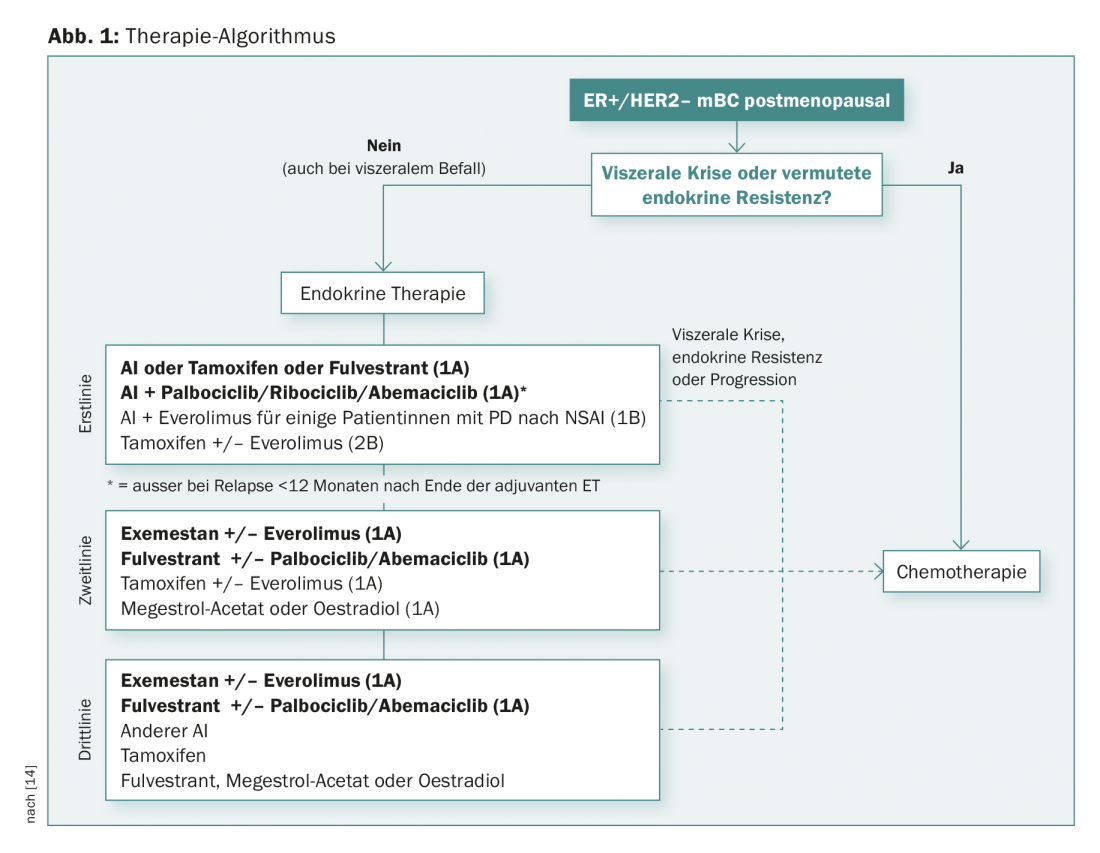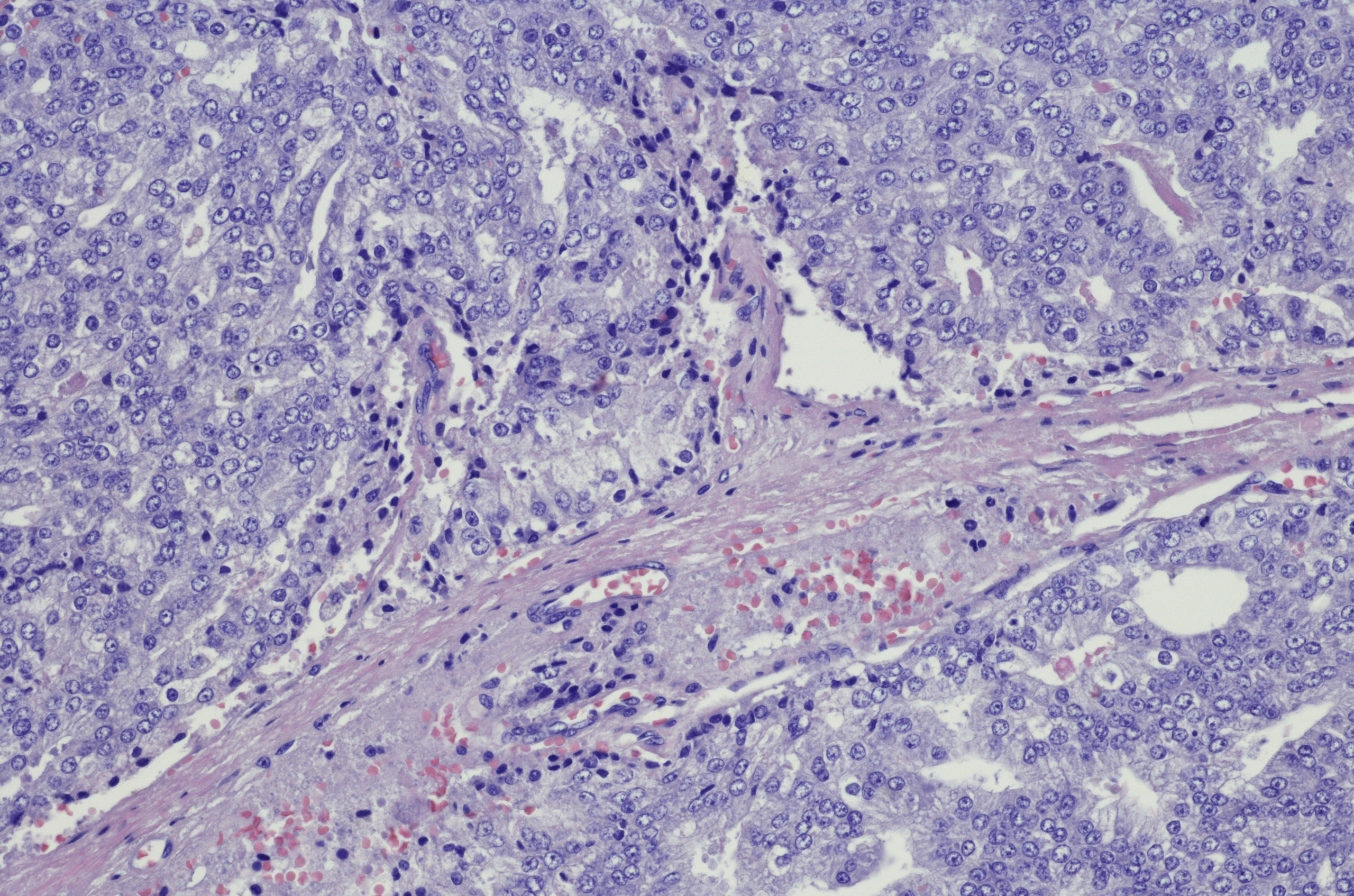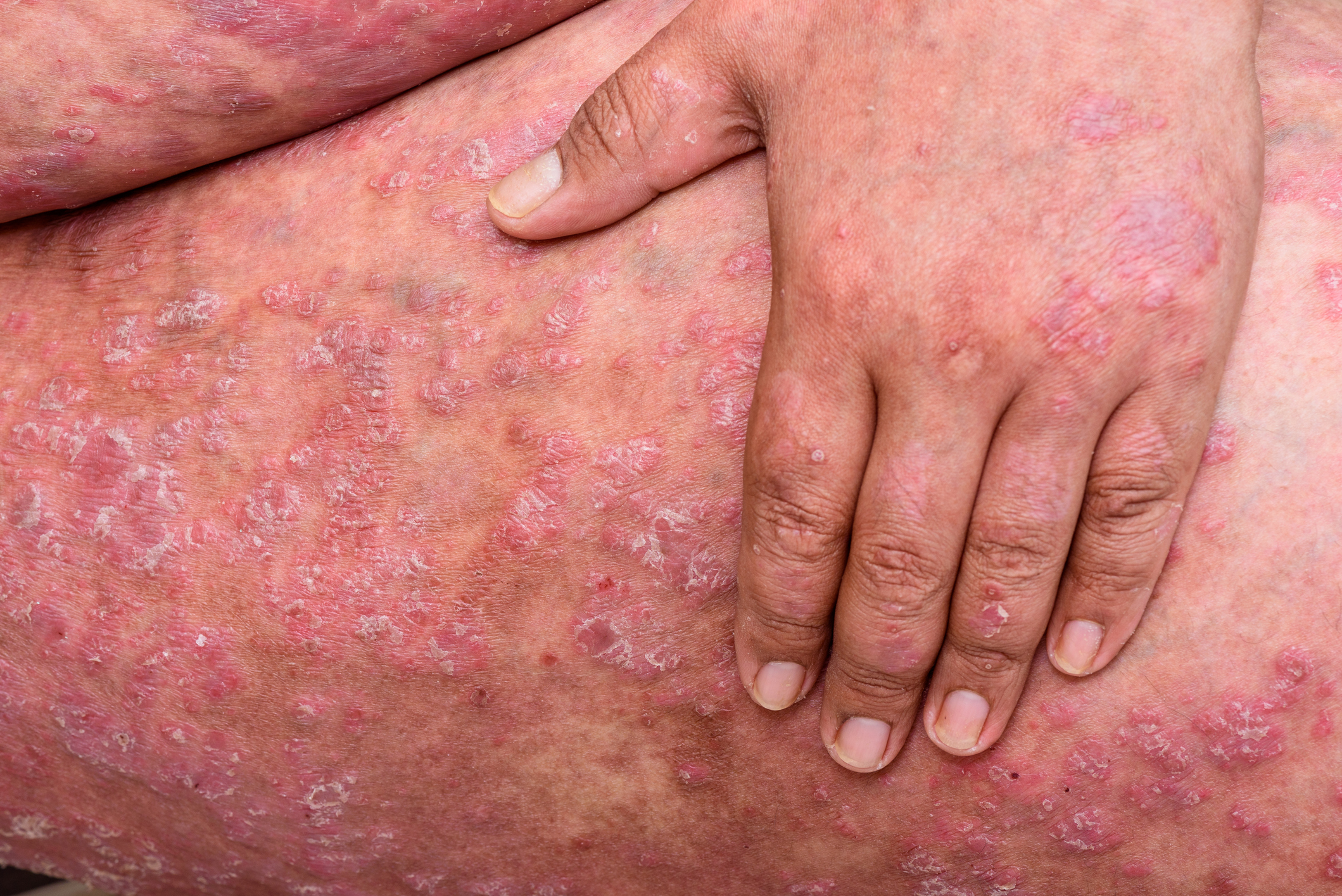In HR-positive metastatic breast cancer, there are several new treatment options. The aim of the annual oncology conference in St. Gallen was to classify and evaluate these substances. What might a modern therapy algorithm look like?
“When we talk about new therapies in this area, we mean mainly everolimus (Afinitor®), palbociclib (Ibrance®), ribociclib (Kisqali®) and abemaciclib (not yet approved in Switzerland) – to some extent also fulvestrant, which already appeared on the market in the early 2000s,” says Dr. Müller. “The studies on the aromatase inhibitors letrozole and anastrozole exemplify what we achieved with the older drugs postmenopausally in the first-line setting: Compared with tamoxifen, they significantly prolonged progression-free survival and resulted in comparable or higher response [1–3].”
In the FALCON trial [4], fulvestrant was shown to be superior to anastrozole in the first-line setting. After approximately six months, the PFS curves diverged. The response was comparable. A subgroup analysis showed that patients without visceral involvement in particular lived longer without progression (HR 0.59), while those with visceral involvement did not benefit compared with anastrozole (HR 0.99).
Currently, endocrine therapy is the preferred option for estrogen receptor-positive advanced breast carcinomas, including visceral metastases (except in cases of “visceral crisis” or presumed endocrine resistance – for these cases, primary chemotherapy should be chosen). But which agents and combinations are preferred in modern endocrine therapy?
Problem: Resistance
“The development of resistance to endocrine therapies is inevitable in the metastatic setting,” the speaker said. The term “primary resistance” is used when the tumor progresses in less than six months under endocrine therapy, whereas the term “secondary” is used when the tumor progresses after this period. This is true for the primary metastatic situation.
In the initial adjuvant setting, “primarily resistant” means early recurrence up to two years after starting adjuvant endocrine therapy. “Secondary resistant” tumors are those that do not recur until two to approximately six years (under extended adjuvant therapy), and “sensitive” tumors are those that do not recur until at least one year after the end of adjuvant therapy.
The mechanisms of resistance are diverse. ER mutations (activating mutation ESR-1) are common, for example. Such are acquired, occur in 15-30% of those previously treated with endocrine therapy, and result in resistance to tamoxifen, aromatase inhibitors, and fulvestrant (possibly not fulvestrant-HD [5]). Other resistance mechanisms include cellular bypass signal transduction pathways.
Solution: New active ingredients
For some of these bypass routes, the new drugs mentioned above are now available.
Everolimus, for example, targets the bypass via PI3K/AKT/mTOR pathway by inhibiting mTOR. As a serine threonine kinase, mTOR has a key function in this signaling pathway, which is known to be impaired in many human malignant tumors. BOLERO-2 [6] showed significant superiority in the primary endpoint of PFS in the second-line setting in combination with exemestane versus exemestane alone. The curves diverged already after about one and a half months and the benefit was also reflected in the response. No significant effect was demonstrated in the secondary endpoint, overall survival, although the study was of course primarily powered for PFS. A troublesome and common toxicity of the drug is stomatitis, which the SWISH trial showed can be controlled, at least to some degree, with dexamethasone mouthwash four times daily. Furthermore, pneumonitis may occur, requiring interruption of therapy for moderate and severe symptoms. Overall, the quality of life does not seem to be relevantly impaired by the active substance, but it does not seem to be improved compared to exemestane alone.
Another mode of action is CDK4/6 inhibition. The cyclin D-CDK4/6 complex regulates cell cycle progression via phosphorylation of the retinoblastoma (Rb) protein. Endocrine resistance is associated with persistent cyclin D expression and Rb phosphorylation. Selective CDK4/CDK6 kinase inhibitors target precisely this point. In the PALOMA-3 trial [7], presented at ASCO 2015 and elsewhere, palbociclib was shown to be superior to fulvestrant alone in the second-line setting when combined with fulvestrant. Again, the PFS curves separated very early (after approximately one and a half months). If you look at the toxicity, the profile with neutropenia and alopecia may remind you of chemotherapy at first. “However, the alopecia is almost always grade 1 and the neutropenia is clearly different from that seen with chemotherapy,” the speaker explained. Hematopoietic stem cells and early neutrophil progenitors are dependent on cyclin D-CDK4/6 activity to enter, progress through, and proliferate in the cell cycle. Thus, whereas with CDK4/CDK6 kinase inhibitors neutropenia results from cell cycle arrest and thus recovery is usually rapid during the course (not cumulative), DNA damage and apoptosis of proliferating precursors with chemotherapy results in delayed recovery. Grade 3/4 neutropenias with palbociclib are controllable in that over two-thirds of events occur in the first cycle, and the risk of severe neutropenias is low after dose reduction [8].
And the first line?
MONALEESA-2 [9] demonstrated the superiority of ribociclib with letrozole over letrozole alone in the first-line setting (risk reduction in the primary endpoint PFS of more than 40% as well as improved response). The results were flanked by PALOMA-2 (palbociclib) [10] and MONARCH-3 (abemaciclib) [11] – the effect of the different CDK4/CDK6 kinase inhibitors is comparable. The differences are most apparent in the toxicity profile. The most common serious adverse events were neutropenia in PALOMA-2 and MONALEESA-2, in addition to alopecia, fatigue, and anemia in palbociclib, and additionally nausea in ribociclib. In MONARCH-3, it was mainly diarrhea, along with fatigue and also neutropenia and alopecia.
“Corresponding subgroup analyses show that no clear clinical or molecular patient group has yet been identified that does not benefit from the new drugs. So there are also no established predictive biomarkers yet,” Dr. Müller explained. “In older women over 70 years of age, efficacy appears to be the same. Tolerability, however, is significantly worse here – as might be expected.” Quality of life with palbociclib is no worse in the first-line setting, but no better than with letrozole alone [12]. In contrast, in the second-line setting, the combination with the CDK4/6 inhibitor is superior to fulvestrant monotherapy in terms of quality of life [13].
How to decide?
In addition to valid biomarkers, adequately powered OS data on the new targeted agents in hormone receptor-positive metastatic breast cancer were still lacking at the time of the presentation – as were optimal sequencing studies.

A possible algorithm for postmenopausal patients with ER+/HER2- metastatic disease is shown in Figure 1. “Endocrine therapy alone is a good option in low remission pressure. The combination with CDK4/CDK6 inhibition is effective in the first line and also later. It is an important option at remission pressure (even in elders with more toxicity though). Everolimus and exemestane are effective after failure of endocrine therapy. ‘Effective’ with the new agents currently still means an improvement in PFS and response (and not yet in OS),” Dr. Müller summarized.
Source: 28th Physician Continuing Education Course in Clinical Oncology, February 22-24, 2018, St. Gallen, Switzerland.
Literature:
- Mouridsen H, et al: Phase III study of letrozole versus tamoxifen as first-line therapy of advanced breast cancer in postmenopausal women: analysis of survival and update of efficacy from the International Letrozole Breast Cancer Group. J Clin Oncol 2003 Jun 1; 21(11): 2101-2109.
- Nabholtz JM, et al: Anastrozole (Arimidex) versus tamoxifen as first-line therapy for advanced breast cancer in postmenopausal women: survival analysis and updated safety results. Eur J Cancer 2003 Aug; 39(12): 1684-1689.
- Nabholtz JM, et al: Anastrozole is superior to tamoxifen as first-line therapy for advanced breast cancer in postmenopausal women: results of a North American multicenter randomized trial. Arimidex Study Group. J Clin Oncol 2000 Nov 15; 18(22): 3758-3767.
- Robertson JFR, et al: Fulvestrant 500 mg versus anastrozole 1 mg for hormone receptor-positive advanced breast cancer (FALCON): an international, randomised, double-blind, phase 3 trial. Lancet 2016 Dec 17; 388(10063): 2997-3005.
- Fribbens C, et al: Plasma ESR1 mutations and the treatment of estrogen receptor-positive advanced breast cancer. J Clin Oncol 2016 Sep 1; 34(25): 2961-2968.
- Baselga J, et al: Everolimus in postmenopausal hormone-receptor-positive advanced breast cancer. N Engl J Med 2012 Feb 9; 366(6): 520-529.
- Cristofanilli M, et al: Fulvestrant plus palbociclib versus fulvestrant plus placebo for treatment of hormone-receptor-positive, HER2-negative metastatic breast cancer that progressed on previous endocrine therapy (PALOMA-3): final analysis of the multicentre, double-blind, phase 3 randomised controlled trial. Lancet Oncol 2016; 17(4): 425-439.
- Verma S, et al: Palbociclib in Combination With Fulvestrant in Women With Hormone Receptor-Positive/HER2-Negative Advanced Metastatic Breast Cancer: Detailed Safety Analysis From a Multicenter, Randomized, Placebo-Controlled, Phase III Study (PALOMA-3). Oncologist 2016 Oct; 21(10): 1165-1175.
- Hortobagyi GN, et al: Ribociclib as First-Line Therapy for HR-Positive, Advanced Breast Cancer. N Engl J Med 2016; 375: 1738-1748.
- Finn RS, et al: Palbociclib and letrozole in advanced breast cancer. N Engl J Med 2016 Nov 17; 375(20): 1925-1936.
- Goetz MP, et al: MONARCH 3: Abemaciclib As Initial Therapy for Advanced Breast Cancer. J Clin Oncol 2017 Nov 10; 35(32): 3638-3646.
- Rugo HS, et al: Impact of Palbociclib Plus Letrozole on Patient Reported Health-Related Quality of Life: Results From the PALOMA-2 Trial. Ann Oncol 2018 Jan 19. doi: 10.1093/annonc/mdy012 [Epub ahead of print].
- Harbeck N, et al: Quality of life with palbociclib plus fulvestrant in previously treated hormone receptor-positive, HER2-negative metastatic breast cancer: patient-reported outcomes from the PALOMA-3 trial. Ann Oncol 2016 Jun; 27(6): 1047-1054.
- Cardoso F, et al: 3rd ESO-ESMO International Consensus Guidelines for Advanced Breast Cancer (ABC 3). Ann Oncol 2017 Jan 1; 28(1): 16-33.
InFo ONCOLOGY & HEMATOLOGY 2018; 6(2): 38-40.












